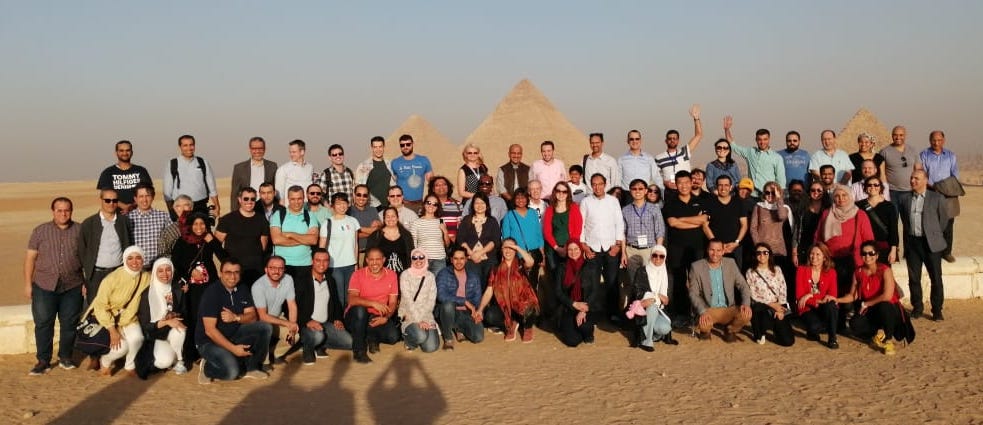ASU engineers at the frontier of water research

Fulton Schools faculty members Elham Fini (left) and Francois Perreault (center) were joined by recent environmental engineering doctoral graduate Ahmed Aljanabi (right) at the annual Arab-American Frontiers of Science, Engineering, and Medicine symposium, held in Cairo, Egypt, on Nov. 17–19, 2019. Photo courtesy of Francois Perreault
Leaders in science, engineering and medicine from the United States and the Middle East gather annually for the Arab-American Frontiers of Science, Engineering, and Medicine symposium to discuss scientific and research advances.
Arizona State University was well represented, with two faculty members and a graduate of ASU’s Ira A. Fulton Schools of Engineering attending the seventh annual symposium in Cairo, Egypt.
Assistant Professor Francois Perreault and Associate Professor Elham Fini from the School of Sustainable Engineering and the Built Environment, one of the six Fulton Schools, and Ahmed Aljanabi, a recent doctoral graduate in environmental engineering, were invited to attend the symposium.
“The goal is to bridge the American and the Arab community together, but also to make connections within the Arab world with other countries,” Perreault said.
Organized by the U.S. National Academies of Sciences, Engineering, and Medicine, the gathering focused on water management, artificial intelligence, infectious disease, sensing technologies and community resilience.
About the resilience theme, Perreault said, “When we think about our program in sustainable engineering and think about building our environment to have sustainable infrastructures in the long term, it connects well with what we do. The water section also speaks well to us in environmental engineering.”
Perreault conducts research in water treatment, while Aljanabi works in water resource management. They note the conference emphasized the strong connection between the water issues researchers focus on in the Middle East and with the issues facing Arizona.
“When it comes to water and resilience in the face of climate change and water scarcity, there’s a lot of overlap between what they’re going through with desertification and water management that connects really well with the realities that we have here in Arizona,” Perrault said.
The National Academy of Engineering also provides opportunities for fellowships enabling Arab researchers to come to the U.S. to conduct research in their fields. Perreault said the event provides an opportunity to network with scientists and engineers in the Arab community and explore ideas of future research pursuits.
“With the way they manage and think about water, there are a lot of things we can learn,” he said.
The symposium was conducted in partnership with the Library of Alexandria and Academy of Scientific Research and Technology, noted Daniel Placht, a senior program assistant at the National Academies.
“In addition to the speaker sessions, there were two poster presentation sessions along with a keynote and a couple of talks about programs and funding opportunities,” Placht said.
“Overall, the whole conference was fascinating,” Perrault said, “because it’s tailored to be on the frontiers of knowledge and the frontiers of your field.”

Attendees of the symposium had the opportunity to visit the pyramids at Giza. Photo courtesy of Francois Perreault
More Science and technology

Time-consuming task of conserving Jane Goodall Institute field notes gets a boost from AI
Arizona State University is continuing the legacy of scientist, conservationist and ethologist Jane Goodall by bringing decades…

AI and robotics researchers at ASU work to keep people safe, healthy
As Arizona State University continues to shine in U.S. patent rankings, robotics and artificial intelligence garner a growing…

A new chapter in national security research at ASU
In 1957, the Soviet Union launched Sputnik, the world’s first artificial satellite, into a low orbit around the Earth. Only the…